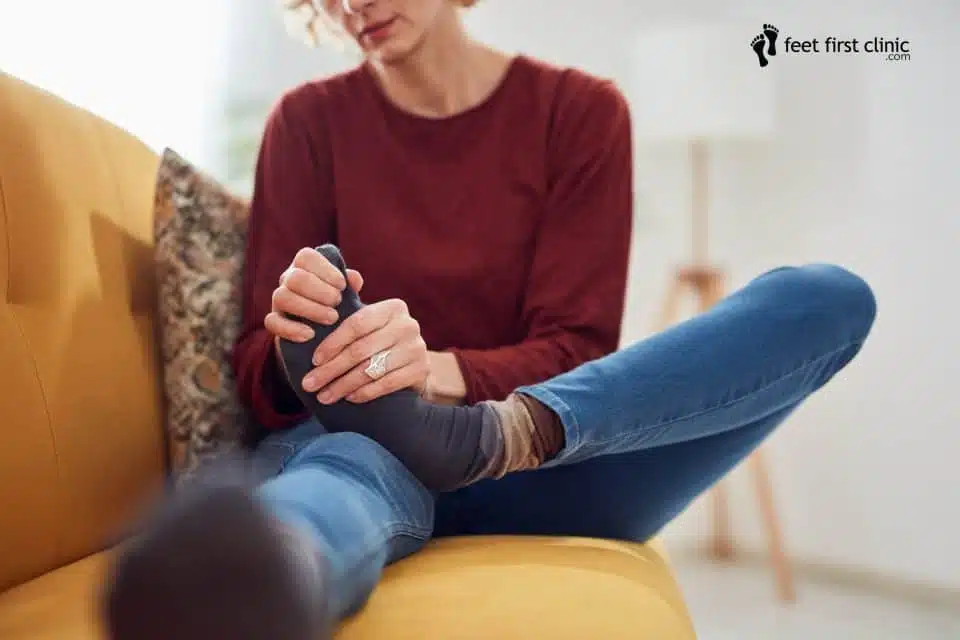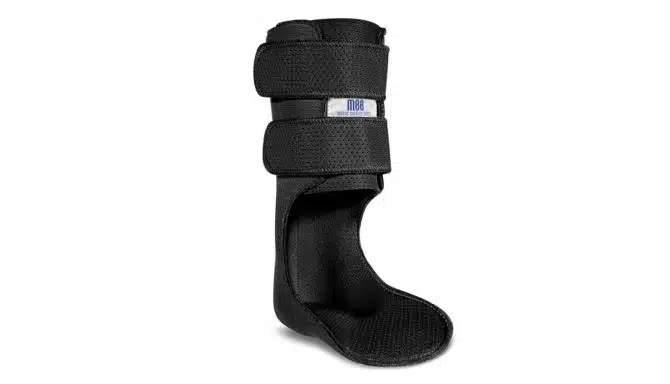Arthritis is a medical condition that affects our joints, causing pain, swelling and stiffness. One of the most common risk factors is age. That said, while arthritis mainly affects people over the age of 40, it can develop at any age. Here at Feet First Clinic, our chiropodists regularly treat patients who have arthritis in their feet. Likewise, foot-care experts note that 5 types of arthritis can target our feet. Today, we’ll go over those with you, as well as the signs and symptoms of each type. We’ll also give you a list of treatment options that have been known to help patients live a normal, healthy life.
What Types of Arthritis can Affect our Feet?
5 types of arthritis can affect our feet and ankles:
- Osteoarthritis
- Psoriatic arthritis
- Rheumatoid arthritis
- Post-traumatic arthritis
- Gout
Osteoarthritis
Osteoarthritis is the most common form of arthritis and can affect any of the 33 joints in the foot. Commonly referred to as “wear-and-tear” arthritis, it is caused by the gradual erosion of cartilage on the ends of our bones. This cartilage cushions our joints, so when it gets worn down, bones rub against each other, which causes foot pain. Women over the age of 50 are the most at risk of developing osteoarthritis. That said, other risk factors include obesity and pre-existing foot conditions such as Bunions and clawed toes.
Psoriatic Arthritis
Psoriatic arthritis is a form of arthritis specifically affecting those who suffer from psoriasis. Psoriasis is an auto-immune disease that affects the skin. Patients typically notice painful patches of redness and bumps on the skin, sometimes covered by white, scaly skin. Not every person with psoriasis is guaranteed to experience psoriatic arthritis, but some patients are at risk. Mayo Clinic notes that most patients develop the skin disorder first and notice joint pain later, although the joint pain can sometimes be experienced first. Those experiencing psoriatic arthritis in their feet typically notice swollen and stiff joints.
Rheumatoid Arthritis
Rheumatoid arthritis is another form of arthritis that can affect your feet. Age is not a common risk factor for rheumatoid arthritis; it can affect younger people too. It is an autoimmune condition that causes excessive inflammation buildup in your joints. The inflammation severely damages the joints and typically affects both feet. Most doctors or foot specialists can distinguish rheumatoid arthritis from other types by looking for damage in both feet. In many cases, rheumatoid arthritis can ultimately lead to deformities in your feet in the form of curled toes(claw toes) and bunions. Other symptoms include:
- Joint stiffness and soreness
- Other foot deformities, including flat feet, splay foot, and hammertoes
- Difficulty with simple activities, such as walking, standing, etc.
- Enlarged joints
- Swelling and warmth
- Intermittent pain that can flare up or subside at random
Post-Traumatic Arthritis
Post-traumatic arthritis in the foot is a form of osteoarthritis that targets a joint that has sustained an injury. Arthritis commonly develops in older people, but post-traumatic arthritis can affect someone who was not at risk of developing arthritis before their injury. Likewise, the US National Library of Medicine notes that post-traumatic arthritis can occur in people from age 30-40. If they have sustained an injury in their foot, it can “strongly contribute to premature development of osteoarthritis.”
Sports injuries, falling and spraining your ankle, and other forms of physical trauma can weaken your joints, putting them at risk of developing osteoarthritis. Specifically, if a foot or ankle injury doesn’t heal properly, the joint weakness puts extra strain on your feet. This speeds up the wear-and-tear process in the feet, erodes the cartilage and leads to bone damage. Symptoms include joint pain, swelling, fluid accumulation in the affected joint, and difficulty walking.
Gout
Some people are surprised to learn that Gout is a form of arthritis. Gout is an inflammatory foot condition and is quite serious and debilitating. The pain can be intermittent, and gout flare-ups often come on suddenly and severely. The pain is so severe that even bedsheet touching your foot can be excruciating.
Gout is caused by excessive uric acid production, which triggers an autoimmune response that results in a gout attack. Most gout patients are men over age 40. Additionally, living a sedentary lifestyle and alcoholism are risk factors. Gout normally targets the big toe, but if left unaddressed it can affect other joints in the foot too. Other symptoms including redness, swelling, and protrusions that look similar to bunions.
What Are Some Treatment Options for Arthritis in the Feet?
- Lifestyle Changes: You should speak to a chiropodist about exercises you can perform from home that can help ease your foot pain. These exercises can be performed quickly and fit easily into a daily routine. The goal is to strengthen your muscles and improve your mobility. You should also try sticking to a healthy diet: many unhealthy foods can cause inflammation buildup, which can trigger arthritis flare ups and gout attacks.
- Maintenance with a foot specialist: A qualified chiropodist can provide services that can ease foot pain and help with mobility. These include Splinting or bracing your feet, prescribing Custom orthotics and fitting you for Orthopaedic shoes. Other forms of foot care, such as nail care and preventing infection, can also be performed by a chiropodist. If you suffer from arthritis, it is wise to regularly see a chiropodist, as it can be almost impossible for those with debilitating joint pain to maintain proper foot care on their own.
- Medications: Medications such as NSAIDs (non-steroidal anti-inflammatory agents) can be prescribed for gout, psoriatic arthritis and rheumatoid arthritis. If you suffer from gout, you may also need a medication that slows uric acid production, or removes it from your system. If you suffer from psoriatic or rheumatoid arthritis, your doctor may prescribe DMARDs (disease-modifying anti-rheumatic drugs). Over-the-counter anti-inflammatory medicines such as Aspirin can also help manage pain associated with arthritis in the foot.
- Skincare: Routine self-care from home can work wonders for conditions that also affect our skin, like psoriatic arthritis. One of our favourite brands is Gehwol. They make a wide array of foot care products containing various medicinal ingredients, including menthol and vaseline. Check out this blog on some of our favourite Gehwol products!
Do you Have Arthritis in Your Feet? Worry Not!
If you suffer from arthritis in your feet, we want to hear about it. We strongly believe that no one should live their life in discomfort. Our licensed chiropodists are trained to help you manage your foot pain. Our downtown Toronto foot clinic is open 6 days a week! Call us to ask about how you can achieve your goal of happy and healthy feet!
Call us at 416-769-FEET (3338) or Book Your Assessment Today!













